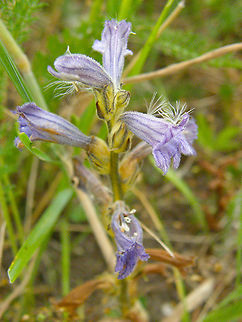
Appearance
15-60 cm plant, furfuraceous-glandulous. Stem a little thickened at the base, fairly robust, simple, bluish, with few scales, 2 cm long. Flowers 18-30 mm long, bent-curved, in usually loose cylindrical spike, rounded at the top. Calyx with lanceolate-acute lobes, usually shorter than the tube. Violet-blue corolla, with darker veins, with acute or obtuse lobes, slightly hairy. Anthers glabrous or with a few cilia. White stigma.Naming
Synonym: Orobanche purpureaDistribution
Temperate Europe.Habitat
An annual or possibly perennial herb, parasitic on Achillea millefolium. It typically occurs on dry, somewhat basic soils in cliff-top grassland and on roadsides and grassy banks, usually near the sea. More rarely, it occurs in disturbed artificial habitats. Flowers can reappear after decades of absence, suggesting that the seeds are long-lived or that plants can persist without flowering for many years. Lowland.References:
Some text fragments are auto parsed from Wikipedia.
https://www.tela-botanica.org/bdtfx-nn-48802-synthesehttps://www.brc.ac.uk/plantatlas/plant/orobanche-purpurea
https://fr.wikipedia.org/wiki/Orobanche_pourpr%C3%A9e
https://www.uniprot.org/taxonomy/223125